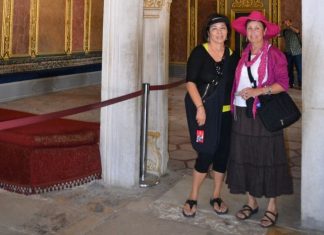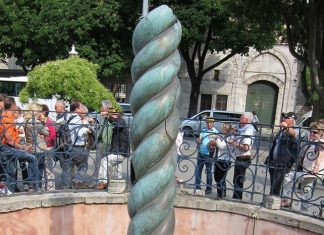He was especially expert in the art of preparing rich savoury sauces, giving the dishes character by combinations of colour and perfume, and summoning all Nature to his aid– anything to excite the palate. Being dominated by his gluttony and sexual passions, he became afflicted with arthritis, and worse still, his feet gave him such trouble that he was unable to walk. That is why, after his accession, no one saw him attempt to walk with any confidence: he used to ride on horseback, in safety.
For the theatre and horse-racing he had an absolute obsession. To Constantine these things were a matter of real concern, as he changed horses, harnessed fresh mounts, and anxiously kept his eye on the starting-points in the arena. The gymnepodia,**25 long ago neglected, was also revived in his reign. He reintroduced it into the theatre, not content with the emperor’s normal role of spectator, but himself appearing as a combatant, with opponents.
It was his wish, moreover, that his rivals should not be vanquished simply because he was the emperor, but he liked them to fight back with skill– his own credit for the victory would then be the greater. He used to chatter away, too, about his contests, and he mixed well with the ordinary people. The theatre also attracted him, and no less the chase. Once engaged in the latter he was impervious to heat, ignored the cold. and never gave way to thirst. Most of all he was skilled in fighting with wild beasts, and it was because of this that he learned to shoot with the bow, hurl the javelin, draw his sword with dexterity, and aim his arrow straight at the mark.
He neglected the affairs of his Empire as much as he devoted himself to his checkers**26 and dice, for so ardent was he in the pursuit of gaming and so enraptured by it, that even when ambassadors were waiting to attend on him, he would neglect them if he was in the middle of a game. He would despise matters of the utmost importance, spend whole nights and days at it, and fast completely, voracious eater though he was, when he wanted to play at the dice. So, playing away his Empire, he was surprised by Death, and Old Age reminded him suddenly of the decay that Nature ordains.
When, therefore, he felt that the end was near, either persuaded by his counsellors, or through his own recognition of duty, he began to cast round for an heir to his throne, intending to betroth the second of his daughters to the man he chose. As, however, he had never regarded any member of the Senate with more than a cursory glance before, it was difficult for him to make a reasonable choice.
One of the persons considered was a certain man, prominent in the Senate, who had been promoted to the office of Eparch**27– an imperial dignity, although it did not carry with it the privilege of wearing the purple– but since this gentleman had married while still in his childhood, he hardly seemed a suitable candidate. In the matter of family and social position, he was more acceptable than his rivals, but in the eyes of the Church his previous marriage was an obstacle to further promotion. It was commonly agreed that he must be passed over.
Death prevented the emperor from examining
Meanwhile, since circumstances did not permit of more deliberation, and the near approach of death prevented the emperor from examining the claims of various men in detail, he condemned everyone else as unworthy of a royal marriage, and gave his full support to Romanus. He knew that Romanus’s wife opposed the scheme, so he pretended to be in a most violent, implacable rage with her husband. Messengers were sent, ostensibly to take awful vengeance on him and to carry her off to a nunnery.
She, not knowing the secret of the plot, nor seeing that the emperor’s anger was only a mask, immediately submitted to her fate. Her hair was cut off, she was clothed in the nun’s robe of black, and admitted into the nunnery, while her husband was taken up to the palace, to wed into the imperial family.
The most beautiful of Constantine’s daughters was no sooner in his sight than she was made his bride. So her father, having survived just long enough to see the marriage ceremony completed, passed away and left the Empire to his kinsman, Romanus. **28
Read More about Subsequent promotion








